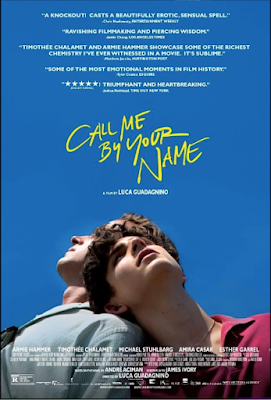 |
| Call Me by Your Name (2017) |
"Call Me by Your Name (2017)"- Insightful Film Review by Jacklyn A. Lo.
The Nuances of Love
In the realm of human emotions, love stands as a complex and multifaceted concept, encompassing a spectrum of feelings that range from the tender affection between family members to the passionate infatuation of sexual partners.
However, our current level of consciousness providing a limited vocabulary, often fails to capture the subtleties of love, employing a single term to describe both the physical intimacy of sex and the profound connection of a mother's bond with her child. This linguistic inadequacy leads to potential misunderstandings, particularly when examining the portrayal of love in cinematic works.
A Tale of Seduction
In the film Call Me by Your Name (2017), directed by Luca Guadagnino and written by James Ivory and André Aciman, the viewer is presented with a story that initially appears to be a tale of blossoming romance between a 17-year-old student named Elio and an older man named Oliver. However, upon closer examination, the film's narrative reveals a more complex and unsettling dynamic, one that challenges the simplistic categorization of "love story."
Power and Manipulation
The film's plot initially leads the viewer to believe that the relationship between Elio and Oliver is a consensual and mutually fulfilling one. However, as the story progresses, cracks begin to appear in this façade. Elio's frustration with the perceived lack of physical intimacy between them culminates in a poignant outburst: "God, we wasted so many days! Why you didn't give me a sign?"
The Weight of Intentions
Oliver's response to this emotional plea is a revelation: "I gave you a hint when I touched you on the 'football' field." This statement, seemingly innocuous at first, exposes the power imbalance inherent in their relationship. Oliver, with his maturity and experience, holds a distinct advantage over Elio, a young man still navigating the complexities of adolescence and self-discovery.
Exploiting Innocence
The term "seduction" more accurately captures the nature of Oliver's actions. His deliberate and calculated approach to Elio, a boy half his age, raises questions about the validity of their connection. The label of "love story" seems inappropriate, given the inherent power imbalance and the potential for exploitation.
It is important to recognize that any physical action, including a touch, is deeply influenced by a person's intentions. In other words, Oliver's touch was not a casual one; it was a calculated move in his plan to seduce Elio.
Any touch can evoke a range of emotions, but a touch driven by hidden intentions carries far greater weight. In the case of Oliver and Elio, the power dynamic and the consequences of their interactions suggest a relationship that extends beyond the realm of mutual affection and into the territory of seduction.
Unfulfilled Promises
The logline of the film, "In 1980s Italy, romance blossoms between a seventeen-year-old student and the older man hired as his father's research assistant," paints a picture of a tale steeped in romance. However, as the narrative unfolds, it reveals a far more complex and unsettling dynamic, one that challenges the simplistic categorization of "love story."
A Narrative of Dissonance
While the film Call Me by Your Name (2017) boasts high production values and captivating performances, it is the responsibility of the filmmakers to accurately convey the essence of their story. The film's failure to reconcile the logline's promise of romance with the narrative's exploration of seduction leaves the viewer grappling with questions about the nature of love, consent, and the exploitation of innocence.
Lingering Questions
The film Call Me by Your Name (2017) challenges the simplistic categorization of "love story" and presents a more complex and unsettling dynamic. The filmmakers' failure to reconcile the concept of seduction with the logline's suggestion of a romance leaves the viewer grappling with questions about the nature of love, consent, and the exploitation of innocence.
In Conclusion
Distinguishing good from evil, wheat from chaff, and love from lust is a lifelong journey that becomes smoother with practice. A higher level of consciousness fosters an expanded understanding, leading to a clearer perception of the consequences of our actions and minimizing negative consequences, i.e. karma.
Notes:
- Please find more about the Development of Consciousness
- Image credit: ©IMDb
- Edited using Bard from Google AI
More Metaphysical Movie Reviews – Jacklyn A. Lo
Check Our Featured Screenplay Melissa
Explore TV-Series Redemption

.png)
